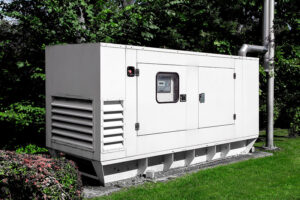There’s nothing worse than being in the middle of something and the power goes off! Now more than ever you can’t rely on the main power system as it’s becoming increasingly unpredictable and unreliable. It’s time to take matters into your own hands and make sure you have a stable power source to always keep your lights and plugs switched on.
Here’s where a backup power system comes in. It’s a simple solution to ensuring you stay connected and avoid disruptions between household or work tasks. If you’re considering installing a substitute power supply, it’s vital you do it legally. Let’s take a closer look at a generator connection and solar-ready backup systems and how an electrician can help you make the switch.
How Does A Generator Connection Work?
A generator supplies electric power during a power outage. It prevents the break between daily activities and continues the flow of business operations. Modern generators come in various electrical and physical configurations and are designed for use in numerous applications.
Think of a generator as a machine that creates electric energy via voltage and current. Based on the principle of electromagnetic induction, it produces electricity. There are two main types of generators, and both describe the type of current flow in a circuit:
Alternating Current (AC) Generators
An AC generator converts mechanical energy into electrical energy and generates this as an alternating current output in waves. The electric charge in AC generators changes direction occasionally. Household outlets use alternating currents.
Direct Current (DC) Generators
DC generators have an electric current that flows only in one direction. Computers, TVs, batteries and electronic devices use DC electricity. After an AC current enters a particular device, it converts to a direct current.
What’s The Difference Between a Back-Up Generator and A Standby Generator?
It’s helpful to understand the difference between a back-up generator and a back-up generator. A back-up generator runs independently and isn’t installed or connected to your home’s electrical system. In a power disruption you would need to plug in your generator and start it manually to power specific appliances you’d like to remain running.
Standby generators are larger and installed by directly linking them to your main switch board. These automatically switch on during power disruptions.
Whole-house standby generators take care of powering multiple systems in your house in the event of a power outage. The South African National Standard (SANS) requires this type of installation to be performed by a qualified electrician, along with the issue of a certificate of electrical compliance (COC).
What Are The Advantages of Using A Generator?
If you use a portable generator, it’s compact enough for you to literally have power wherever you go! Benefits of installing a standby generator include:
- An easy, reliable and continuous power supply to your computer, lights and TV
- Automatically delivered electricity during any power outage
- Protection for your home from blackouts at all times, while electrical appliances are kept running
What Do I Need to Install A Generator?
Any generator installation in South Africa must comply with the SANS (IS0 SANS 8528 series of standards). You’re required to have your generator installed by a licensed electrician.
Due to the nature of the electrical work involved, and to ensure you comply with health and safety regulations, you’ll need a valid electrical COC. To make sure the electrician you use is registered, you can contact your local Electrical Contracting Board of South Africa to verify their credentials.
What Should I Know About Installing a Standby Generator?
Before making the switch, there are a few things you should know about installing a generator to your main power supply:
- You can’t do this yourself and need an electrician to assist you.
- You can only install one generator per property.
- Generators are limited to operating during main power outages only, apart from service and maintenance work.
- To reduce the risk from carbon monoxide, keep the generator roughly 5 meters away from your house.
- You should store your fuel in a place that avoids the potential risk of fire, and is always out of reach of children.
- If you live in a residential area, your generator will need to meet the requirements of maximum noise levels it produces when operating at maximum capacity (measured indoors, with open windows, this can’t exceed 25dB).
- You can’t plug your generator into the wall socket. Backfeeding is not only highly hazardous but also illegal. Earth leakages left switched on can cause damage to your generator once the power supply returns, which may result in electrical fires. If you switch off your earth leakage to counteract this risk, your electrical system wouldn’t have sufficient earth leakage protection and this could then be an even greater electrocution hazard for your household.
How Do I Know Which Generator To Buy?
The size of the generator you purchase depends on the total sum of the maximum electrical load (measured in watts) that you expect to be powered simultaneously at any given time. Consider the appliances and lights you use most often—in your bathroom, kitchen and living room—as well as your garage door and security system, whether it be an alarm or electrical fencing.
A calculation of all the loads you’d like to run concurrently in your household gives you a good idea. Generator sizes vary according to their capacity, so it’s best to pinpoint the electrical units in your household that need the most electricity, and add this to your calculated total. The generator you pick needs to serve larger units that require extra electricity, so that you avoid a system overload.
How Does Solar Energy Work?
Maybe you’re considering an eco-friendly option and leaning towards a solar-ready back-up system approach. There are a variety of solar-ready inverters and battery back-up solutions to pick from.
Solar technology converts sunlight into electrical energy through photovoltaic (PV) panels or via mirrors that concentrate solar radiation. This energy then generates electricity or is stored in batteries or thermal storage.
What Are The Advantages of Using Solar Energy?
If you’re looking for a renewable energy source, solar energy is truly this as it’s completely off the grid. Other benefits of using solar energy include:
- Low maintenance costs
- Reduced electricity bills
- The generation of electricity or heat
What Is A Solar-Ready Back-Up System?
A solar-ready back-up system is connected parallel to your existing electrical board. It serves as a power source when the main power supply is out or not available. Even if the main power supply source falls away completely, a solar-ready back-up system ensures you have a swift and steady power source to keep your lights and plugs working.
Solar-ready back-up systems allow you to upgrade to a full off-grid power system. All you need to do is add solar PV panels; you don’t even have to replace components in your current power system. With a solar-ready back-up system, you can pick an inverter, AC combiner or changeover switch, amongst other options.
What Do I Need To Install A Solar-Ready Back-Up System?
You will need a qualified electrician to install an integrated power back-up system. A back-up system that’s built into your existing electrical system legally requires the installation of a second DB board. A back-up system connection will therefore be isolated and operate from this second DB board, with the necessary fused breakers and switches.
As with a generator installation, you also require an electrical COC for an alternative energy installation. An electrician can assist you with this. Make sure that the installer of your solar-ready back-up system issues an electrical COC to prove that the installation is safe and within the scope of relevant regulations.
Can I Add A Battery Back-Up To An Existing Solar System?
Perhaps you already have a solar system and are wondering whether you can install batteries in this existing system. Yes, you can!
A home solar battery unit can last anywhere between five and 15 years. Compared to the 20- 30-year lifespan of a solar power system, if you installed a solar battery now, you would need to replace it within that period.
What Should I Know About Installing a Solar-Ready Back-Up System?
While making the switch to solar energy is one of the greenest things you can do, there are a few other things you should know:
- As with a standby generator, you can’t do this yourself and need an electrician to assist you.
- The initial outset of purchasing a solar system is relatively high, so you will need to budget accordingly for this. Solar energy storage is also costly.
- The weather in your region plays a huge part. Even though South Africa is a predominantly sunny country, solar energy is weather-dependent. Solar energy can still be collected on cloudy and rainy days, but the cooler and wetter weather can affect the efficiency of the solar system.
- Solar energy uses a lot of space, so make sure you have a suitable area for solar panels such as on your roof.
How Do I Know Which Solar-Ready Back-Up System To Install?
It can be tricky to know what solar-ready back-up system you need. To calculate how to size your solar system, determine your daily kWh energy requirement and divide it by your peak sun hours to know the kW output. After you’ve done this, divide the kW output by your solar panel’s efficiency and you’ll have an idea of the estimated number of solar panels you’ll need for your solar system.
[Conclusion]
There are definitely more benefits to drawbacks when it comes to installing a standby power supply.
Whether you pick a generator or a solar system, you’ll be set and ready to stay connected when the rest of your area is without power.
If you’re unsure and need any guidance, ask an electrician for some advice. The team at Mr Volt is ready to help you and answer any questions you may have. Our expert qualified electricians can provide you with old and new generator connections to your building, advise you regarding solar-ready back-up system integration as well as perform any related DB board installation and rewiring. Give Mr Volt a call today and enjoy the advantages of staying connected to a power supply 24/7!



